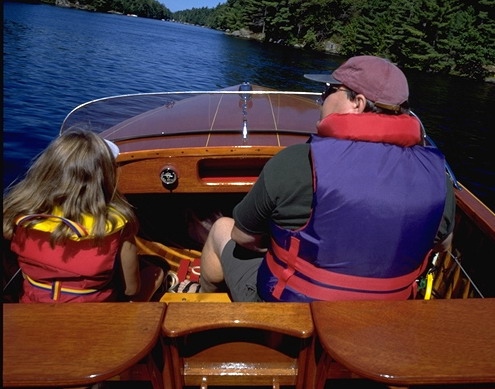 |
Boating is a
great activity, whether you take to the water to paddle, sail, fish or cruise.
Whatever your passion may be, the Canadian Safe Boating Council advises that
learning how to boat safely will increase your enjoyment of boating.
As a boater,
you are legally responsible for equipping yourself and your boat, operating your
vessel safely and ensuring the safety of your passengers. You are responsible
for knowing the laws and regulations that govern the safe operation of vessels
on Canadian waterways. One of the best ways to learn the basics of safe boating
is to take a course and write an accredited test.
In 1997, the
Office of Boating Safety consulted with Canadians to determine the most
effective ways of making our waterways safer. One of the key recommendations was
to have the operators of power driven pleasure craft pass an accredited test. As
a result, the Competency of Operators of Pleasure Craft Regulations was passed
requiring recreational power boaters to earn a proof of competency.
The first
phase, which came in effect in 1999, requires all operators of pleasure craft
fitted with a motor born after April 1, 1983 to have proof of competency. The
second phase, which came into effect in 2002, has required all operators of
recreational power boats under 4 metres in length to have proof of competency,
The final requirement, being phased in on September 15, 2009, will require all
operators of power boats to have proof of competency.
There are a
couple of ways to get your Operator Competency Card. Challenge the test if you
all ready have the knowledge, attend a one day course, purchase a personal study
guide, or study on-line. So what will you learn when you study for your test?
Depending on the guide, course or provider, you may just learn the basics to
qualify for a Pleasure Craft Operator Card, or get a more in depth look at safe
boating practices. Regardless of the choice you make, you’ll learn the rules of
the road, the navigation system, safe boating practices, safety equipment
requirements, seamanship and basic boat handling.
The rules of
the road will familiarize you with the Collision Regulations, Small Vessel
Regulations, Boating Restriction Regulations and Criminal Code of Canada. These
acts outline the rules for navigation, speed, right-of-way, avoiding a
collision, boat licensing, age and horsepower restrictions, safety, the laws
governing drinking, and more.
Your training
will cover the Canadian Navigation System, providing you with an understanding
of the buoys and other navigation aids you will encounter on the water. You’ll
learn the importance of charts, how to read them and how to identify and avoid
the hazards marked by navigation aids.
All aspects of
being a safe boater and your responsibilities on the water will be covered. A
typical course will teach you about your boat and its equipment and general
boating terminology. Personal safety equipment, including personal flotation
devices and lifejacket requirement will be reviewed. The all important safety
equipment required by law for each vessel size and its use will be reviewed to
ensure you are properly equipped for an emergency and the water. Preparing for a
trip will be covered, teaching you how to use weather information, the
importance of filing a trip plan and the need to familiarize yourself with the
local area where you will be boating.
The more
complete courses and study guides will provide you with a basic grounding in
seamanship and basic boat handling skills. The topics covered may include
anchoring, docking your boat, basic line handling and knots. The basic skills to
operate your boat, steering, throttling and trimming your vessel will be
covered, along with learning how to handle emergency situations when you are on
the water.
Safe boating is
everybody’s responsibility and the best way to become a safe and confident
boater is to take an accredited course. To learn more about the courses offered
in Canada, where you can take them and how to get your Pleasure Craft Operators
Card click here or visit
www.boatingsafety.gc.ca or call the Boating Safety Info-line at 1-800-267-6687
and remember……Boat Safe – Return Safe. Enjoy your time on the water and “have
many happy returns.”
|

